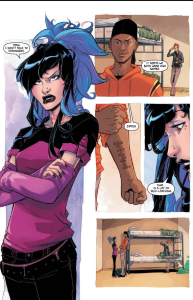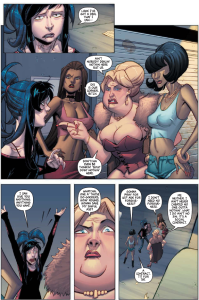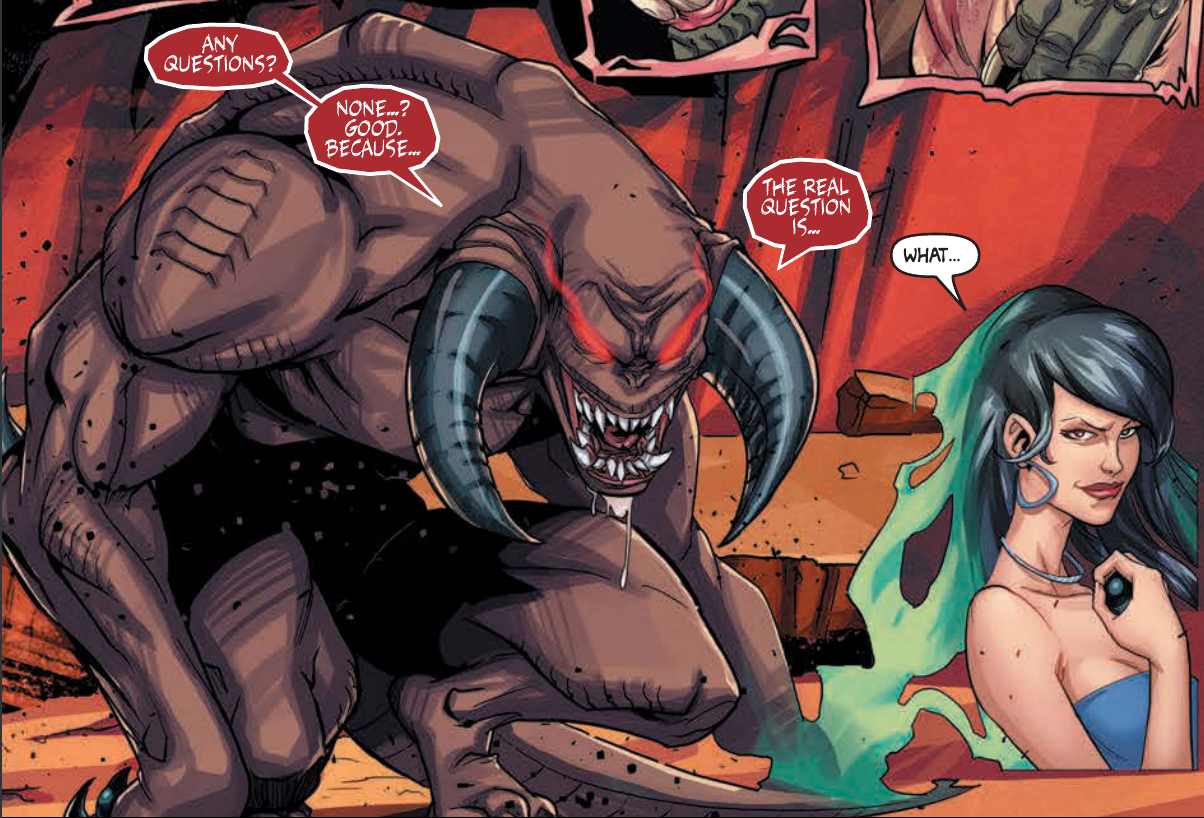If I have one criticism of Oh, Hell, it’s that the plot feels rushed. In one volume we meet the main characters, learn of the school in Hell, learn the backstories of the main characters, and have a resolution to the plot. George Wassil has a lot going on in this story and it’s too bad he didn’t have the room to spread it out over at least two volumes.
I’d been intrigued to read the story since speaking with him at Baltimore Comic-Con 2015. Our main character, Angela (who also goes by Zoel) was found abandoned in a dumpster as a baby. She becomes an exceptionally trying teenager and her adopted parents send her to what they think is another boarding school, but is actually a school in Hell. Who wouldn’t want to see where that goes?
In an interesting twist, by embracing the mystical (Hell), it becomes slightly less mystical than Morning Glories in which the reader has NO IDEA what’s going on at the end of the first volume. One of the first ideas Wassil is asking us to consider is whether anyone is irredeemably doomed to Hell. The headmaster constantly tells the students they belong in Hell. They were going to end up there anyway at the end of their lives, what does it matter if it happens while they’re in high school?

Related to that theme is one of whether a rotten life is a valid excuse for one’s behavior. We’re presented two different scenarios. While Angela was indeed abandoned by her original parents in a dumpster (sending the message she’s trash, rather than someone worthy of an orphanage), she has a loving set of adoptive parents. The adopted kid acting up is a cliche, but it’s also a cliche with roots in reality. Sometimes kids end up shuffled around or put into bad families and the system can make them overly hard as a protective mechanism. At the same time, when put into a loving family, does the child still have an excuse to act out simply because they aren’t with their birth parents? I have three adopted siblings and my parents treat them the same as they treated us and, so far, they’re no more nor less rebellious than we ever were. Then there’s Zipper. He’s also in Hell because of his upbringing. But in his case, his father is literally a demon. He had to adapt to survive, but in the end he stands for the belief that we can outdo our upbringing. I don’t think it’s an easy task based on what I’ve seen with others, but it can certainly be an uplifting message to a receptive mind.
Wassil also gives a motive to Satan’s desire for souls. Rather than simply a contest between God and The Devil, each soul collected gives the demon power, including the power to assume any form. This increases the stakes for grabbing the souls and, as with the demon soul that ends up being a plot point, gives the demons an incentive to steal souls from each other and hunt each other for the privilege of collecting prized souls. Given all the hassles that demons seem to go through for souls in our culture, it certainly makes sense for them to be of some value other than just spitting in God’s eye.

Related to the soul theft is the age-old adage that everyone has a price. The kids are told to figure out what it is anyone is willing to trade a soul for and use that to get souls. What makes Wassil’s take on it so fun is that he does a bit of deconstruction with Angela’s attempt to get anyone’s soul. For someone that can’t do like Alese and take the obvious sex route because of her looks and confidence, it takes a lot more than an unsolicited offer of anything for a soul. It’s why modern tales (if you could call something as old as It’s a Wonderful Life modern) always involve the supernatural being taking some time to convince the mark that he can really get something in exchange for his soul. The Brendan Fraser remake of Bedazzled has a set of scenes (like the hamburger scene) that come to mind when thinking of how badly things for for Angela. The key difference being that Elizabeth Hurley’s Devil is messing around with Fraser while Angela is desperate to succeed.
As you can see, Wassil is trying to get through a lot of concepts in one volume while keeping things entertaining. While it does feel a bit rushed, it is still a good read with some great art. It lays a good foundation for a world that would be fun to explore and the volume ends with what would be the first couple pages of the next volume.
Questions? Comments? I love to chat, so feel free to comment whereever you happen to see this.
Oh, Hell Vol 1 written by George Wassil with art by Dave Hamann and colors by Michael Birkhofer and Ross A Campbell. Lettering by Troy Peteri.
